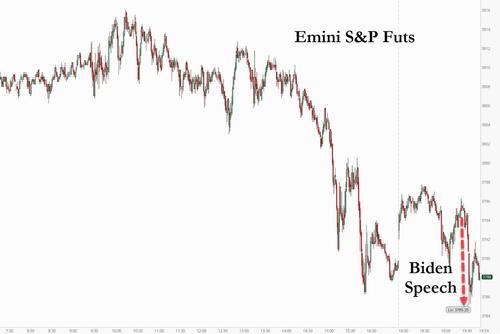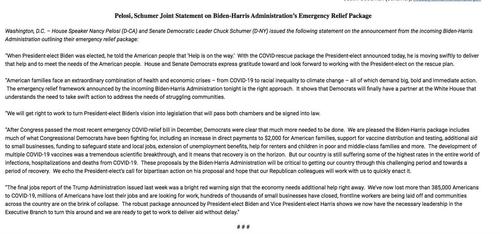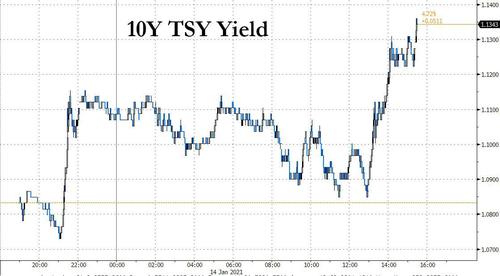"We have to act and we have to act now," Biden said, ahead of laying out a second, even broader economic recovery plan next month at a joint session of Congress. That initiative will include money for longer-term development goals such as infrastructure and climate change, the transition team said. So even more trillions.
As Bloomberg summarized it, "Biden's speech had the flavor of a shorter and more concise State of the Union address, focused of course on the pandemic and economic recovery. He laid out a number of goals and some plans yet basically set broad goals -- and asked Congress to foot the big price-tag to achieve them."
Biden's bill - which amounts to $400 billion for Covid-19 management, more than $1 trillion in direct relief spending and $440 billion for communities and businesses - is more than double the $900BN bipartisan bill approved last month, and only slightly below the March 2020 Cares Act. The bigger size, and inclusion of Democratic priorities such as a minimum-wage hike, also means that it will be next to impossible for Republicans to vote for Biden's proposal.
This is a problem because as we explained previously, certain key measures such aid to states and money for health care, will likely need 60 votes in the Senate. On the other hand, jobless benefits, stimulus payments and the minimum wage hike, could go through with a simple majority under a special budget tool. Amusingly, progressives are already saying Biden's bill isn't big enough.
While Biden didn't mention Trump by name, but he took several swipes at the current administration, especially in terms of the vaccine rollout, which he called a "dismal failure." That's tougher language than other officials have been using.
A brief recap of Biden's proposal is below:
- Direct payments of $1,400, on top of the $600 approved in December
- $400 per week in supplementary unemployment benefits through September
- $350 billion for state and local governments
- Raising the minimum wage to $15 an hour
- $130 billion to help schools reopen
- $160 billion in funding for a national program of vaccination, testing and other coronavirus containment efforts
- $30 billion for rental and small-landlord support
- $25 billion for childcare providers
- Expanded food assistance
- Expanded child tax credits
- Expanded medical and family leave
Of course, since none of the above addresses the primary reason for the destruction of the US middle class, namely the Fed and its moneyprinting abilities, nothing proposed by Biden will have any effect on US society besides a brief sugar high. Once that wears off, the polarization, the wealth and income divide, and the class hatred, will be even worse.
There were no surprise in what Biden said after all of it was purposefully leaked in advance, and Eminis dropped 10 points, drifting near session lows after the speech.

There is a distinct risk that the recent market euphoria will fade soon once traders realize, that Bide's use of the phrases "paying their fair share" and "closing loopholes" could spark a tax-hike driven selloff since the stimulus boost is already fully priced in. This, as Bloomberg notes, is a moment "in which the market could pivot to some of the other risks associated with a Blue Wave like taxation or antitrust scrutiny."
His full speech is below.
Here are the main highlights:
Stimulus Checks
- The plan includes a central promise of Democrats: boosting direct payments to individuals to $2,000 for most Americans, on top of the $600 that Congress approved in December.
- The plan would also allow residents who are married to undocumented residents to receive stimulus payments -- who were barred in prior rounds.
Vaccinations, Testing
- Biden's plan includes $20 billion to create a national vaccine distribution program that would offer free shots to all U.S. residents regardless of immigration status.
- The plan calls for creating community vaccination centers and deploying mobile units in hard-to-reach areas. Biden is also calling for $50 billion to ramp up testing efforts, including purchasing rapid-result tests, expanding lab capacity and helping local jurisdictions implement testing regimens.
State Aid
- Biden is pushing for $350 billion in funding assistance for state, local and territorial governments plus $20 billion for public transit systems.
- Democrats for months have pushed for more money to help state and local governments that have faced higher costs and lower tax revenue during the pandemic. States and cities warn they'll be forced to make deep cuts to public health, safety and education programs without more funding, because they can't borrow money in the way the federal government can.
- Many Republicans have chafed at more money for local governments, however, saying it amounts to a bailout for mismanaged government budgets.
Unemployment Insurance
- Biden's plan would extend and expand unemployment benefits that are scheduled to run out in mid-March. The proposal increases a weekly federal benefit to $400 from $300 and extends it through the end of September.
- It also extends benefits for self-employed individuals and gig workers, and those who have exhausted their regular jobless benefits.
Minimum Wage
- Biden is calling to more than double the federal minimum wage to $15 an hour from $7.25, a proposal that could alienate Republicans. In addition, he seeks to end the tipped minimum wage used widely by restaurants and the hospitality industry. At $2.13 an hour, it gives lower minimums to employees that get tips.
Paid Leave
- The Biden plan would create a requirement for employers, regardless of size, to offer paid sick leave during the pandemic to workers -- a change that the transition team says will extend the benefit to 106 million workers. Parents and family members caring for sick relatives or out-of-school children could receive more than 14 weeks of paid sick and family leave.
- The plan would provide benefits of up to $1,400 per week and tax credits for employers with fewer than 500 employees to reimburse them for the cost of the leave.
Tax Credits, Childcare
- Biden would expand tax credits for low- and middle- income families and make them refundable for 2021. He is proposing to expand the child tax credit to $3,000 from $2,000 for each child 17 and younger. Children under age six would be eligible for $3,600.
- Biden is also requesting $25 billion for a stabilization fund to help open child-care centers and $15 billion in grants to support essential workers in meeting childcare costs.
Schools
- The plan is also calling for $170 billion to help schools to open -- something Biden has said would allow many parents, especially women, to rejoin the labor force after they dropped out to care for children learning at home.
- About $130 billion would go to K-12 schools to help them hire additional staff to reduce class size, modify spaces and purchase resources to help meet students' academic and mental health needs. The plan would also direct $35 billion to colleges and universities and create a $5 billion fund for governors to direct help to schools most hard-hit by the virus.
Rental Assistance
- The proposal would extend the eviction and foreclosure moratorium through September. It would also provide $30 billion to help low-income households who have lost jobs pay rent and utility bills. The plan would also provide $5 billion to states and localities to offer emergency housing for families facing homelessness.
Small Businesses
- Biden is proposing to leverage $35 billion in government funds into $175 billion in low-interest loans to finance small businesses. He is also calling for $15 billion in grants for such employers. He is proposing to use laid-off restaurant workers to partner with federal nutrition programs to get those employees working again.
While the plan may not receive Republicans support, Democrats are firmly on board, with Pelosi and Schumer both saying that the proposal is the "right approach."

* * *
It may not be quite $2 trillion as CNN leaked last night, quoting "one lawmaker" in close contact with the Biden team who said it was "taking a shoot for the moon" approach with the package", but it's close.
With less than 4 hours to go until Biden's 715pm ET speech in Delaware, in which he is expected to unveil his fiscal program, the NYT reports that Biden's spending package "to combat the coronavirus pandemic and its effects on the economy, with an initial focus on large-scale expansions of the nation's vaccination program and virus testing capacity" will be $1.9 trillion.
The first package, which "will cover the pandemic, the economy, health care, education, climate change and other domestic priorities" according to Brian Deese, the incoming director of the National Economic Council who spoke at the Reuters Next conference on Wednesday, will include money to complete $2,000 direct payments to individuals, and aid to small businesses and local and state governments.
One thing that markets may not like is that contrary to previous expectations that the "stimmy" check will be $2,000, Biden will instead propose additional $1,400 stimulus checks, "topping up the $600 checks that Congress approved in December." This means roughly one-third less purchasing power to buy out of the money call on stocks trading at all time highs.
The NYT also notes that the first piece of legislation will include an extension of supplemental federal unemployment benefits, which are set to expire in March for many workers, and more help for renters.
Plans for the first package also include a significant increase in spending on vaccine deployment, testing and contact tracing, Mr. Deese said, and Mr. Biden will seek enough money to allow most schools to open, in an effort to increase labor force participation.
"We need to get the schools open," Mr. Deese said, "so that parents, and particularly women, who are being disproportionately hurt in this economy, can get back to work."
Stocks dropped to session lows on news that instead of an $2,000 additional stimmy, the Biden plan will "only" include another $1,400, adding to the previously released $600 from the December $900BN stimulus plan.
Meanwhile, the fact that Biden is indeed going through with an almost $2 trillion stimulus - contrary to that such an amount could be overly aggressive and be met with resistance even among centrist Democrats - has sent 10Y yields to session highs.

Commenti
Posta un commento